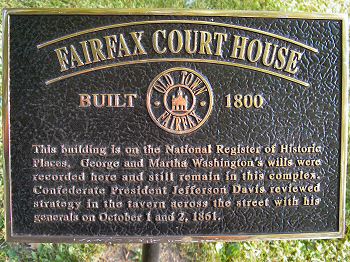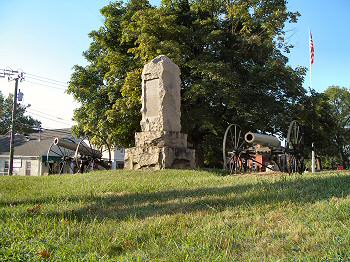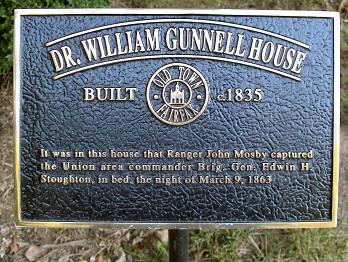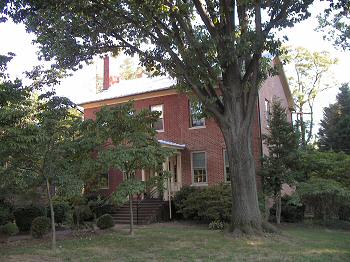|
Fairfax
Dr. William Gunnell House, Built c. 1835
The March 9 raid on Fairfax Courthouse made Mosby's reputation, both among
his colleagues in the Confederate army and among the enemy. The original
target of the raid had been Col. Sir Percy Wyndham, the British adventurer
in command of Federal cavalry in the area. However, Wyndham had eluded
Mosby's grasp, having gone into Washington DC to attend a social function.
Wyndham had been openly critical of Mosby, calling him a horse thief,
making him a prime target for receiving his comeuppance. Wyndham's
commanding officer, Brigadier Gen. Edwin Stoughton was not so lucky. At
the Dr. William Gunnell house on March 9th, 1863, Lieutenant Prentiss,
awakened by shouts that there were dispatches outside, was foolish enough
to open the door to the raiders. Six men strode in, but it was the
smallest of them, the wiry one with the plume in his hat, who stuck a
revolver in the lieutenant�s ribs while he stood in the entranceway in his
nightclothes holding high a smoking oil lamp. Upstairs the beplumed
intruder walked into the bedroom of Brigadier General Edwin H. Stoughton
and pulled down the covers. The brigadier was laying on his side, snoring,
but he roused up stupidly, still somewhat intoxicated from his evening�s
soiree, when Mosby lifted his nightshirt and slapped him on the behind
announcing, Get up General, and come with me. The sound of the voice
brought Stoughton more fully awake and, when he realized the man bending
over him was a stranger, he shouted, What is this! Do you know who I am,
sir? I reckon I do, General. Did you ever hear of Mosby? Yes, have you
caught him? No, but he has caught you. Despite a few of the prisoners,
including Lt. Prentiss managing to escape, Mosby had pulled off a
spectacular raid, capturing a brigadier general, two captains, 30
prisoners and 58 horses without the loss of a single man or one shot being
fired |
|
Fairfax
 Photo of General
Stoughton
Photo of General
Stoughton
Dr. William Gunnell House
When President Lincoln was informed of Stoughton's capture he disgustedly
remarked that he could make another general with the stroke of a pen but
he sure hated to lose those horses. It was Lincoln himself who named Mosby
"The Gray Ghost." The Union Army's biggest fear in Washington was that
Mosby would kidnap Lincoln from right beneath their nose. Lincoln, upon
hearing several of his generals discussing Mosby and their fears, loudly
announced, "Listen to you men, you speak of Mosby as though he is a ghost,
a gray ghost." It wasn't until after the war that Mosby learned of this
and that the nickname stuck |



